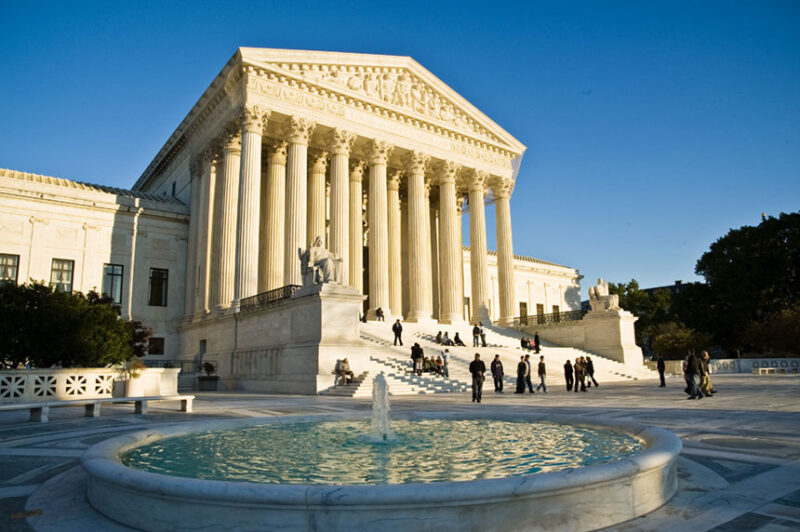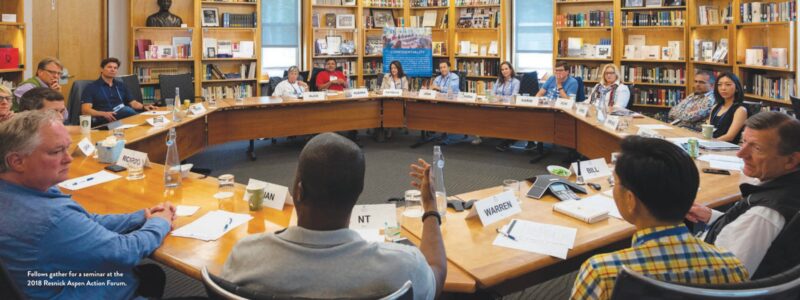Our Society Reimagined
An exploration of the most timely domestic issues, participants discuss the various sides of the issues that are shaping modern society and are given the opportunity to understand opposing perspectives in a civil, moderated environment.
Our Society Reimagined is a four-week discussion series that brings community members together to explore timely domestic issues that shape our modern society. Participants are given reading materials that will be used as background for lively, moderated discussions each week. Using the practice of civil dialogue, moderators will facilitate conversations that will help participants gain perspective on the underlying values and ideas that we hold as individuals and as a society and will explore how these tenets shape our lives.
The 2025 series will take place in person on our Aspen Meadows campus (Lauder Room/Koch Building located at 1000 N. Third Street) from 6:00-8:00 pm MT on four consecutive Wednesdays, October 15-November 5. Tom Morrison and Clint Kinney will return to moderate the series.
Fee: $195, includes all sessions, refreshments, and reading materials. Registration for the 2025 Series has now closed.
Schedule (full session descriptions below):
October 15: Do Our Institutions Deserve the Public’s Trust?
October 22: Disagreeing Better: Can Congress Still Find Common Ground?
October 29: Can a Democratic Society be Fair?
November 5: America’s Place in a Changing World
Please contact Ari Mizrahi at ari.mizrahi@aspeninstitute.org with any additional questions.
October 15
Do Our Institutions Deserve the Public’s Trust?
The public’s faith in America’s core institutions has been eroding for decades. From the Vietnam War to the COVID-19 pandemic, missteps and failures have shaken public confidence. Today’s intense partisanship has only deepened the problem, with political actors often exploiting concerns for their own gain. When institutions disappoint people across political, generational, economic, and geographic lines, trust erodes and cynicism spreads. Can such a divided society find common ground to rebuild trust? Could reforms that emphasize transparency, competence, accountability, and civic engagement help restore credibility? Or are recent episodes such as overreaching pandemic policies, the withdrawal from Afghanistan, and lapses in media reporting signs that institutions no longer deserve the trust they once held? In the end, should we “trust but verify” our institutions, or is this the moment for individual leadership to step in and fill the void?
October 22
Disagreeing Better: Can Congress Still Find Common Ground?
The Constitution specifically designed Congress to be the nation’s deliberative arena—where competing interests, ideologies, and regions are brought into tension, negotiated, and resolved in ways that allow society to peacefully coexist despite our differences. Today, however, partisan gridlock and political incentives have left the institution paralyzed, fueling public frustration and strengthening the power of the presidency. Why is Congress increasingly unable to reconcile division into workable compromise? Is this congressional disfunction the driving force behind the long-established trend towards the imperial presidency? In this discussion, we will explore the institutional, political, and cultural roadblocks—from partisan polarization and structural incentives to shifts in media and public trust—that have left the legislative branch struggling to fulfill its core function.
October 29
Can a Democratic Society be Fair?
Balancing fairness with liberty, freedom, and other fundamental rights is critical to the health of our society, but it’s becoming increasingly difficult. This age-old tension is more relevant than ever, as the complexity of modern life makes defining what is truly fair more challenging. After all, where does liberty end and fairness begin? Is equal treatment under the law always the best approach, or should broader social and historical contexts be considered when determining fairness? When something is widely perceived as unjust or simply wrong, what is the most effective and constructive way to protest—or to bring about meaningful change—and what responsibility do we share in making that change happen? This session will wrestle with timeless questions made urgent by today’s debates.
November 5
Rethinking America’s Place in a Changing World
Since the end of WWII, America has led the world and sought to bring democracy and human rights to the citizens of the world. That established role is being actively debated both domestically and abroad, with profound implications for security, prosperity, and values. Should the U.S. remain the guarantor of international order, or retrench to focus on domestic priorities? How do the left and the right differ on issues such as alliances, military commitments, trade, immigration and the promotion of democracy and human rights? This discussion will explore the key questions shaping America’s foreign policy debate: What responsibilities are essential, what burdens are unsustainable, and how should the U.S. balance global leadership with national renewal?


